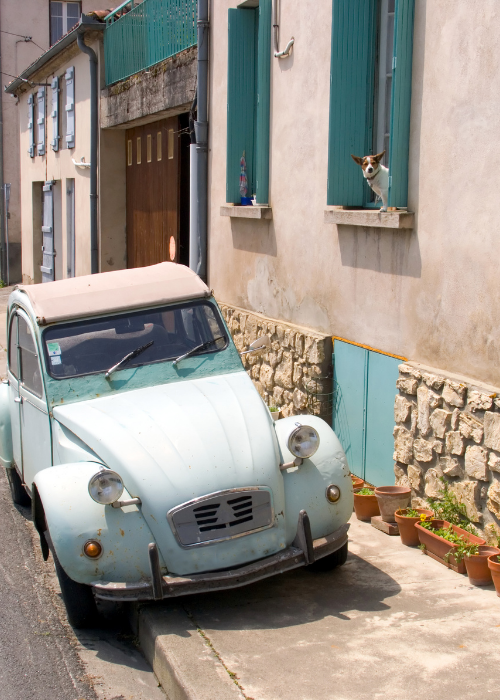To Change A Word Ending In-dor To Feminine Form, Which Letter Would You Add At The End?
Adjectives in French are almost ever quite confusing for beginners. This is considering you must acquire the masculine, feminine as well every bit singular and plural forms. This post explores all the rules in depth and offers a list of the nigh common French adjectives.

In addition to this page, yous might find our honest reviews on Rosetta Stone and Pimsleur to be helpful. Many beginners get off to a very skillful start using these software products. Other's take benefited from French Today's Mastering French Adjectives course. You may as well discover our pages covering French colors, French numbers besides as beginners vocabulary to be hepful.
French BAGS Adjectives

The outset group of adjectives in French that nearly students learn are called BAGS adjectives. BAGS is an acronym that stands for Beauty, Historic period, Goodness and Size. The key thing to sympathise near these adjectives is that they must come earlier the noun they modify. In general, French adjectives come after the noun.
- B (Beauty): boyfriend, belle (cute), joli, jolie (pretty)
- A (Historic period): jeune (young), vieux, vielle (former), nouveau, nouvelle (new)
- 1000 (Goodness): bon, bonne (skilful), mauvais, mauvaise (bad)
- S (Size): grand, grande (big, tall), gros, grosse (large), petit, petite (small-scale, short), long, longue (long)
Here are a few examples of sentences including Numberless adjectives:
- Je regarde united nations vieux motion-picture show. I lookout man an onetime picture show.
- J'achète une nouvelle maison. I'm ownership a new house.
- Sylvie est une jolie fille. Sylvie is a pretty girl.
- Pierre est un petit garçon. Pierre is a lilliputian boy.
- Paris est une belle ville. Paris is a beautiful city.
- J'arrive à l'hotel après united nations long voyage. I arrive at the hotel afterward a long trip.

Regular adjectives in French
Regular French adjectives are adjectives where yous simply add together an -eastward to modify it from the masculine to feminine course. Hither are several examples with example sentences. Subsequently the first example of one thousand, note the position of these adjectives. They come later the nouns they change as they're not BAGS adjectives.
- grand -> grande = big, tall
un k garçon (a big boy), une grande fille (a large daughter) - bleu -> bleue = blue
le ciel bleu (the blue sky), la voiture bleue (the blue car) - gris -> grise = gray
un pantelon gris (a gray pair of pants), une chemise grise (a grayness shirt) - américain -> américaine = American
un homme americain (an American human being), une femme americaine - intelligent -> intelligente = smart, intelligent
united nations homme intelligent (a smart homo), une femme intelligente (a smart woman)
Irregular French adjectives
adjectives that end in -e
Many adjectives practice not follow this cookie-cutter form of simply adding an -due east to make the feminine form. If an adjective ends in -e in the masculine form, information technology stays the same in the feminine course. Here are some examples.
- timde = shy
united nations garçon timide (a shy male child), une fille timide (a shy girl) - rapide = fast
un train rapide (a fast train), une voiture rapide (a fast automobile) - difficile = hard
united nations problème difficile (a difficult problem), une personne difficile (a hard person) - rouge = red
un vélo rouge (a blood-red bike), une voiture rouge (a cherry-red car)
adjectives with spelling changes
There are lots of adjectives where the masculine and feminine endings are different, meaning you don't just add an -eastward. There are groups of adjectives with similar endings.
Masculine adjectives ending in -eux end -euse in the feminine course.
- heureux -> heureuse =happy
un homme heureux (a happy human), une femme heureuse (a happy woman) - dangereux -> dangereuse (unsafe)
united nations endroit dangereux (a dangerous place), une situation dangereuse (a unsafe situation)
Masculine adjectives ending in -f end in -ive in the feminine form.
Speed upwardly your learning with an app
Many of our students have greatly enhanced their learning by using an app. On these pages we've examined the pinnacle-thirty apps for learning French. On this pages we've written comprehensive reviews for Pimsleur (great for people struggling with pronunciation), Rosetta Stone and FrenchPod101 (both bang-up for visual learners).
- actif -> agile = active
un homme actif (an active man), une femme active (an active woman) - sportif -> sportive = athletic
un garçon sportif (an athletic boy), une fille sportive (an athletic daughter)
Adjectives catastrophe in -on, -en and -el double the final consonant before calculation an -e.
- bon -> bonne = skillful
un bon film (a skilful movie), une bonne idée (a good idea) - canadien -> canadienne = Canadian
un homme canadien (a Canadian man), une femme canadienne (a Canadian woman) - cruel -> cruelle = cruel
un homme fell (a savage human), une femme cruelle (a barbarous adult female)
There are many other irregular adjective patterns which you only accept to memorize.
Adjectives ending in -er in the masculine form end in -ère in the feminine grade.
- premier -> première = first
le premier jour (the first solar day), la première fois (the first time)
Some adjectives ending -et finish in -ète in the feminine form. Additionally, some adjective ening in -et become -ette in the feminine class.
- secret -> secrète = secretive
united nations homme secret (a secretive human being), une femme secrète (a secretive woman) - muet -> muette = mute
united nations homme muet (a mute man), une femme muette (a mute woman)
Adjectives that are totally different masculine and feminine forms
Some adjectives are spelled totally differently in the masculine and feminine forms. You only have to memorize these. This is a fractional list. There are many more.
- fou -> folle (crazy)
- nouveau -> nouvelle (new)
- blanc -> blanche (white)
- doux -> douce (soft)
- fake -> fausse (false, incorrect)
- long -> longue (long)
- public -> publique (public)
- sec -> sèche (dry out)
- vieux -> vieille (onetime)

Plural adjectives
All French adjectives must agree in number (singular or plural) with the noun they alter. For most French adjectives, y'all simply add an -s to make information technology plural. Hither are some examples.
- intelligent -> intelligents = intelligent, smart
un homme intelligent (a smart man), des hommes intelligents (smart men) - petite -> petites = small, short
une petite maison (a little house), des petites maison (piddling houses) - grand -> grands (large, alpine)
un grand garçon (a big boy), des grands garçons (big boys)
When masculine adjectives stop in -s or -x they don't modify in the plural from.
- un garçon français (a french male child), des garcons français (French boys)
- un homme courageux (a dauntless human being), des hommes courageux (brave men)
Masculine adjectives ending in -al in the singular end in -aux in the plural.
- un homme génial (a great homo), des hommes homme géniaux (great men)
Masculine adjectives ending in -eau have an -x in the plural course.
- united nations fellow paysage (a beautiful landscape), de beaux paysages (beautiful landscapes)
- united nations nouveau camion (a new truck), de nouveaux camions (new trucks)
Adjectives that can come both before and later the noun
Some adjectives in French can come up both before and later the noun. In these situations the pregnant of the describing word changes. Hither are some examples.
- ancien = quondam, quondam
un ancien ami (a former friend), un ancien livre (an sometime book) - cher = expensive, dear
un cher ami (a dear friend), une voiture chère (an expensive automobile) - propre = 1'southward own, clean
ma propre voiture (my own car), une voiture propre (a clean motorcar) - pauvre = poor (compassion), economically poor
mon pauvre ami (my poor friend), un pays pauvre (a poor country) - prochain = next in a series, adjacent
la prochiane semaine (next calendar week in a series of weeks), la semamine prochaine (next week) - dernier = final in a series, final
la dernier mois (last month in a series of months), le mois dernier (last calendar month)
Most Common French adjectives
Are you looking for a list of top French adjectives which you can memorize? In the table below you'll find the acme-xxx most commonly used French adjectives in both the masculine and feminine forms.

| English language | Masculine | Feminine |
| old | vieux | vieille |
| young | jeune | jeune |
| good | bon | bonne |
| bad | mauvais | mauvaise |
| big | k | grande |
| little | petit | petite |
| happy | heureux | heureuse |
| distressing | triste | triste |
| nice | sympathique | sympathique |
| hateful | méchant | méchante |
| polite | poli | polie |
| impolite | impoli | impolie |
| pretty | joli | jolie |
| beautiful | beau | belle |
| ugly | laid | laide |
| strong | fort | forte |
| weak | faible | faible |
| expensive | cher | chère |
| cheap | bon marché | bon marché |
| fat | gros | grosse |
| thin | maigre | maigre |
| horrible | horrible | horrible |
| wonderful | formidable | formidable |
| smart | intelligent | intelligente |
| stupid | stupide | stupide |
| interesting | intéressant | intéressante |
| dull | ennuyeux | ennuyeuse |
| rich | riche | riche |
| poor | pauvre | pauvre |
Additional Resources
- frenchtoday.com
- francais.lingolia.com (in French)
- lepointdufle.net

- Author
- Contempo Posts
To Change A Word Ending In-dor To Feminine Form, Which Letter Would You Add At The End?,
Source: https://www.frenchlearner.com/adjectives/
Posted by: bryanttretind.blogspot.com


0 Response to "To Change A Word Ending In-dor To Feminine Form, Which Letter Would You Add At The End?"
Post a Comment